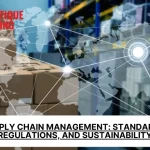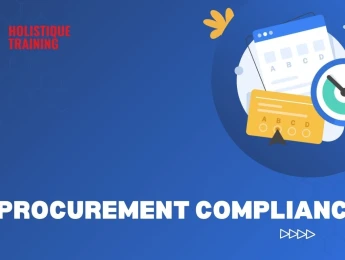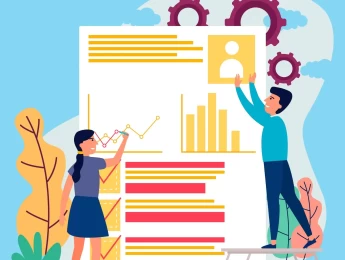The food production industry is incredibly vast and important on a global scale. Food is traded, processed, and managed internationally daily to ensure stores are stocked and customers can continuously buy their staples and luxuries. For this process to remain functional, those involved must thoroughly understand the food supply chain and how each aspect works.
The food supply chain requires extensive collaboration between various parties, from farmers to manufacturers and retailers. Professionals within any position in this supply chain must understand the importance of maintaining positive relationships throughout to ensure effective communication and operational optimisation. Effective collaboration of functions and processes guarantees that the consumer will receive a safe product that is more than satisfactory.
Furthermore, it is vital to manage risk within the food supply chain. With so many organisations and individuals involved in the process, each aspect must be considered and assessed based on potential risks. Once risks are established, preventative measures and corrective actions can be implemented to ensure smooth organisational functions.
Upon completion of this course, participants will be able to:
- Understand the importance of effectively managing a food supply chain.
- Identify key aspects of the food supply chain from a management and social perspective.
- Establish and maintain positive relationships with professionals and customers within the food supply chain from regional and international business markets.
- Evaluate each stage and process within the supply chain, acknowledging their specific opportunities and challenges.
- Assess when it is necessary to offer varying levels of support to ensure the product will always reach the customer.
- Comprehend all food safety laws and regulations on a regional and international basis.
This course is designed for anyone working within the food supply chain who wishes to develop their knowledge and skills. It would be most beneficial for:
- Food Safety Officers
- Operations Managers
- Risk Managers
- Hygiene Inspectors
- Quality Control Directors
- HR Personnel
- Compliance Officers
- Food Procurement Managers
This course uses a variety of adult learning styles to aid full understanding and comprehension. Participants will review case studies of established food supply chains to highlight key aspects surrounding efficiency and food safety and identify any potential areas for improvement.
The participants will have ample opportunities to partake in a variety of learning exercises and will be provided the correct tools to do so. These learning methods include seminars, video materials, group discussions and practical activities. This combination of methods will guarantee that the participants can fully develop their understanding of the taught content and related practical skills.
Day 5 of each course is reserved for a Q&A session, which may occur off-site. For 10-day courses, this also applies to day 10
Section 1: Fundamentals of Food Production
- Comprehending the necessity and importance of food production within society.
- Exploring the history of the agriculture industry and how it has developed to what we know today.
- Assessing opportunities and challenges faced within the industry and how best to navigate them.
- Identifying all aspects of the food production process and their concepts, principles and purpose.
- Evaluating how the industry may evolve in the future.
Section 2: Food Manufacturing and Procurement
- The vitality of food processing.
- Analysing market conditions and expectations and exploring how to best meet demands.
- What processes are included within food manufacturing – processing, packing and safety.
- Managing food inventory – ensuring all food is safe, edible, and appropriate for selling.
- Establishing relationships with food suppliers to ensure the highest quality for an ideal price.
- Recognising trends within the supply chain.
Section 3: Reaching the Retailer
- Evaluating the retail environment and its suitability for products.
- Delivering food to the hands of the consumer – managing food in transit.
- Managing food inventory at the retailer and maintaining relationships to ensure product priority.
- The transition from traditional stores to online retailing – retailers utilising ‘dark stores.’
Section 4: Risk Management
- Examining regional and international food safety regulations to ensure full compliance.
- Understanding where risks can occur and establishing control in situations of crisis.
- Conducting risk assessments regularly throughout the food supply chain.
- Analysing risk data to implement preventative measures and plan for corrective actions.
- Identifying different methods of corrective actions and crisis management – knowing when to recall items.
Section 5: Food Innovation and Sustainability
- Utilising various methods to innovate improvements within the food supply chain.
- How trends and innovative ideas change the way the public views food.
- Engaging in sustainable practices to better guarantee the quality of the products.
- Exploring different methods of recycling food by-products to reduce waste.
Upon successful completion of this training course, delegates will be awarded a Holistique Training Certificate of Completion. For those who attend and complete the online training course, a Holistique Training e-Certificate will be provided.
Holistique Training Certificates are accredited by the British Assessment Council (BAC) and The CPD Certification Service (CPD), and are certified under ISO 9001, ISO 21001, and ISO 29993 standards.
CPD credits for this course are granted by our Certificates and will be reflected on the Holistique Training Certificate of Completion. In accordance with the standards of The CPD Certification Service, one CPD credit is awarded per hour of course attendance. A maximum of 50 CPD credits can be claimed for any single course we currently offer.
- Course Code IND10-103
- Course Format Classroom, Online,
- Duration 5 days














